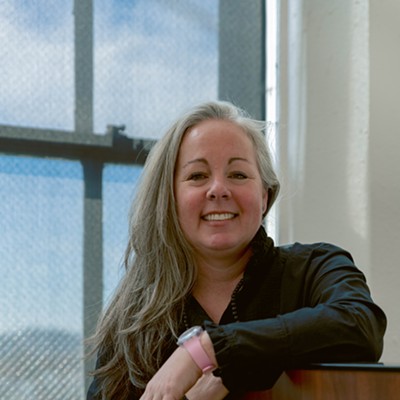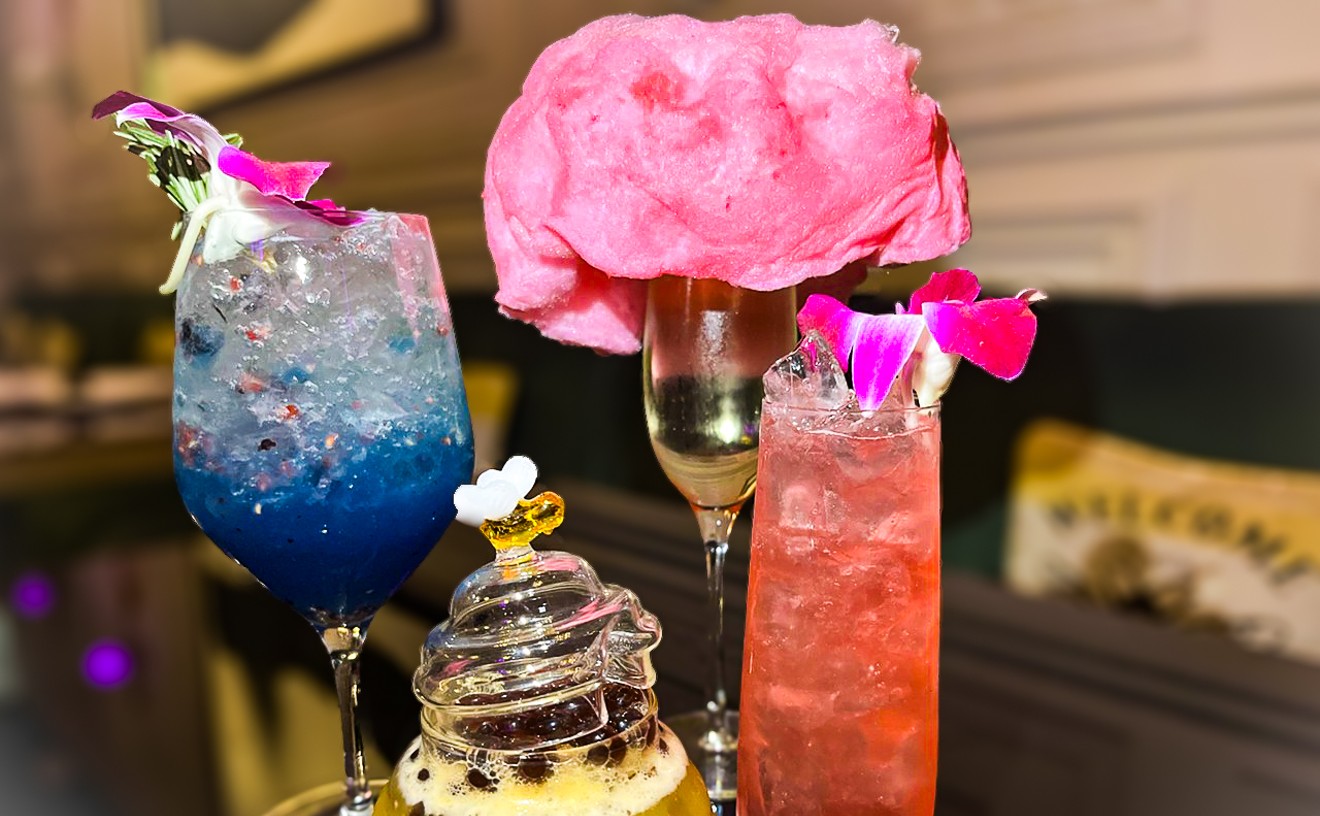Kevin Sprague started roasting his own coffee beans as a hobby almost ten years ago when his wife, Marta, gave him a small tabletop roaster. His hobby eventually turned into Noble Coyote Coffee Roasters and now their small-batch artisanal coffee is served at several restaurants (Sissy's and Bryan Street Tavern) and is sold at Jimmy's Food Store and the White Rock and Saint Michael's farmers' markets or through their website. Soon they hope to be on the shelves at Central Market and Whole Foods. Here's a chat about how they got started and the dutiful science of roasting coffee beans.
When did you start roasting coffee? I started about ten years ago with a small tabletop roaster. I started getting online and sourcing the beans from different places, mostly through Sweet Maria's. I did that for so many years, and eventually got a one-pound drum roaster. Then, the company I worked at for 13 years closed down, the timing was perfect and we decided to start our company.
What's the biggest challenge of selling coffee in Dallas? There's a lot of work once you get into it that you don't really think about. Like trying to source beans all the time. I have to track down importers and get them to send samples. Then, the beans change with each crop depending on weather and other things, so I always need new samples. Sometimes they don't send me Fair Trade samples, or they forget. It takes weeks to track it down. Then dealing with shipping companies is a whole other process.
It's also hard trying to sell coffee in the summer heat. Luckily we found that cold-press coffee does really good.
What's the process for cold-press coffee? There's never any heat applied to the coffee. You just grind the coffee then let it steep for 12 hours then filtrate out all the grounds, so what you have is a concentrate that is diluted one-to-one with water or milk to bring out a little more of the sweetness. The cold press process pulls out the acidity and all you get is this rich chocolate flavor on the backside. It's really an older process that was popular in the '60's and it's starting to come back a little.
Is there a specific flavor profile you aim for with your beans? Well, coffee from different regions is going to taste different. Then when you roast it, that's when you can change the profile of the coffee and how it taste - by adjusting air-flow, time, temperature; between all of those variables, one of those gets off and one day it will taste like cinnamon and the other day something else.
Do you employ any specific process or timing? No, I just work with it and try to meld it. I'll roast it and then let it sit for a few days. It takes about 48-hours for it to develop it's full complexity and roundness. So, I taste it after two days, then continue to try it a couple days after that and log it; from there I can tell what I've done. Every time I roast I keep a chart...
Because even small changes can change the flavor? Yes, even if it's just a few degrees off it can change it, as well as the timing and when you do certain things. I can also regulate gas flow and the airflow. And all of that can change the flavor.
How do you test it - by drinking a lot of coffee? After it's roasted I'll try a cup - for up to five days, until I can tweak out what I like about that bean. I watch what that specific bean's characteristics are, then focus on that aspect or change a factor, like make the heat higher or lower. Basically create a profile for that bean, then once I find it, try to mimic that process every time, which can sometimes can be affected by weather conditions, humidity or a time a year.
Sounds incredibly tedious. It's a challenge to sit there and try to regulate it all the time. That's part of the joy and challenge of it for me though, is trying to find those characteristics and then doing the same thing every time.
Is that the beauty of running a small shop - you're able to make those small tweaks? Yes, I'm the only one who's roasting, so it's all on me if it goes bad, but I have really tight quality control over everything that goes out the door. Is Dallas a good coffee town? I think it's interesting that Dallas is really coming into a culture with coffee, much like Seattle. It's been neat to watch it happen. It's great to see with all the different coffee roasters that have popped up, like Cultivar, White Rock, Oak Cliff Coffee Roasters, all of those guys have made this movement happen for the industry in Dallas and it's kind of neat.
Do you think part of that is because many people are beginning to ask questions about where their food comes from, whether it is vegetables, bread, beer or coffee? Absolutely. Everyone's palate is becoming energized. For so long people were stuck in the mainstream and told, "Here, this is good coffee. Have it." Now we see a lot of fresh roasted coffee and everyone realizes the difference in taste and flavor quality.
Lakewood Brewing Company has been experimenting with your coffee some... They made a Bourbon Espresso Temptress for the Untapped Festival and also for an event at Whole Food Lakewood. They basically soaked the beans in bourbon, drained it off, then with a mallet broke up the beans, so it was like an infusion. It awesome and like nothing you've ever tasted.
Your Honduran bean, Café Bejucales, is direct trade, what does that mean? We met a Honduran farmer through Big Bend Coffee Roasters in Marfa, Texas. So, we get coffee imported directly through him, not through another party. The guy at Big Ben imports the beans through the Port of Houston, picks them up there, then brings them up here to us, which is great s because we hadn't established any direct trades yet. Typically we have to go through importers.
Is that the goal - to go direct as often as possible? That's what makes the Honduran one unique is that no one else has it in the U.S. We're trying to establish one-on-one direct trades partnerships because then we know exactly where the money is going.
There are just so many situations where the workers get treated badly. Sometimes you just don't know the traceability of the beans. But, they're trying to improve the system to watch where every dollar is going. Is it hard to trust importers? All of the importers we use go through a Fair Trade Certification, so they actually send us documents on the traceability of their product. We've made that our standard. Everything is organic and Fair Trade.
So, you have full faith in that system? Yeah, they have to send us a full report. We have to pay a premium for that. It's 30 cents per pound for the traceability and 20 cents for organic, so it's 50 cents more per pound. You pay more, but it's important.
Have you been able to make any trips to coffee plantations? No, but that's something we've always wanted to do. We're trying to plan one for February. We'd like to go to the farm in Honduras and visit the farm.
Have you thought about opening your own coffee shop? I haven't really because my passion is really based on roasting the coffee. People have talked to me about. I'm just trying to make this happen for now.
What's your preferred ratio for making a cup of coffee? Most people say two tablespoons per six fluid ounces, but I prefer a little lighter, like one and a half tablespoons per cup.
What's your favorite coffee right now? For a long time it was from Guatemala, Huehuetenango - it's one we've had since we started. Another I've gotten pretty fond of is our Café Momentum blend; it's a mixture of Guatemala Quiche and an Ethiopian bean. In the fall I'll have a new Costa Rican bean ready and we just put out a Sumatra.
Noble Coyote coffee is available through their website (and if you live near their neighborhood, they may just deliver it) and also at Jimmy's Food Store, White Rock Local Market and St. Michael's Farmers Market. They're also working through some details and hope to be in Whole Foods and Central Market soon. Follow them on their Facebook page.











